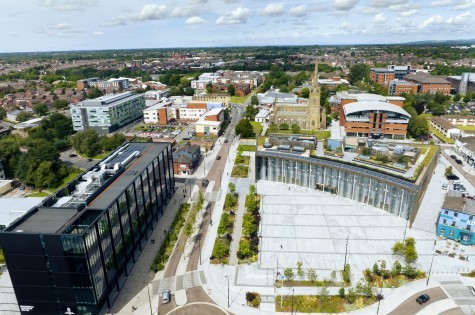The University of Central Lancashire’s Making Carbon Work (MaCaW) project, part funded by the European Regional Development Fund (ERDF), is helping to drive a powerful onshoring message for Pendle Engineering.
Chris Smith, MD of Pendle Engineering, saw a double opportunity in contacting MaCaW. On the one hand, there was the chance for the specialist steel engineers, manufacturers and fabricators to benefit in a similar way to so many other Lancashire SMEs, with a carbon report that could help the business cut its energy costs and operate more sustainably. But there was another, even bigger opportunity to be explored.
The onshoring opportunity
“In the early 2000s we saw the Far East and eastern Europe offer a much cheaper supply of fabricated steel products than we could offer in the UK. Inevitably we saw some of our customers take their business overseas,” Chris explains.
“We’re an advocate of global trade – we understand the realities and merits of it. But in the last 20 years we’ve seen a much stronger drive towards sustainability and environmental awareness. Price is no longer the only consideration.”
With a growing number of customers seeking a more sustainable supply of steel, Chris wanted to find a measurable way of defining ‘more sustainable’. He realised MaCaW offered that opportunity.
“We wanted to make the buying process easier for our clients,” he says, “ and we realised that if we could create a measurable metric of the environmental cost of overseas sourcing versus onshoring we could help make decisions at the customers’ end easier.”
Creating a carbon calculator
Chris asked MaCaW to help him develop a ‘ready reckoner’ that puts a carbon cost on every tonne of steel bought and shipped from overseas. “It is based on several assumptions,” he adds, “but it helps clients put a hard figure to procuring more sustainably – and that makes it much easier to see the benefits.”
Chris is now using the calculator as a regular part of client conversations. “In many sectors, sustainability is now almost as important a factor as price,” he says. “That’s particularly evident for customers who sell themselves as a sustainable business. As we move closer to net zero, sustainability will be something that grows to affect every business and it will be an essential, not just a nice-to-have. So it’s important that we’re proactive – that we get in early and show that, even in the traditionally ‘dirty’ industry of steelwork and fabrication, there are cleaner ways of operating.
“I can certainly say with confidence that it’s far easier to make carbon part of the conversation when you have something tangible to share with clients.”
A virtual energy audit
Although Pendle Engineering’s conversations with MaCaW began pre-pandemic, by the time the audit was ready to begin in earnest lockdown had begun. For the first time, MaCaW’s specialists weren’t able to visit the site or meet the client in person and needed to help steer Chris’ reporting activities remotely.
“We try and understand our plant and machinery as best we can anyway,” says Chris, “so we had a pretty good handle on things, but MaCaW’s support has been very helpful in filling in certain blanks.” As evidence of this, Chris cites an issue with finding data for one of the company’s older industrial ovens.
“We were struggling to identify the consumption and the guys at MaCaW went above and beyond to find similar machines elsewhere which would enable us to make an accurate assessment.”
The results of the assessment were enlightening. Using the gas and electric usage data supplied by Chris, MaCaW calculated a footprint of 681.77 tonnes CO2e (carbon equivalent) per year.
By improving the efficiency of gas burners on powder coating ovens, improving on-site heating, introducing solar PV and making behavioural changes, the audit revealed the potential to reduce carbon output – and energy costs – by more than one third.
Investment-led initiatives are on the longer-term agenda (“the matched funding of up to £15,000 is terrific, but the pandemic has meant we have to be careful with investment right now”) but a range of behavioural and cultural changes have been made. “We’ve discussed the importance of energy management with the team,” says Chris, “and we’re working to reduce the amount of time we leave machinery and lights on. We’re already starting to see the difference coming through in our energy bills.”
Taking the green agenda seriously
“One of the most rewarding aspects of the Pendle Engineering audit was that it highlighted the broader impact of reducing carbon and operating more sustainably,” says Mark Nelson, MaCaW’s Business Engagement Officer. “Chris and the team have seen how, through a combination of behaviour change, energy management and investment, they can lower carbon and cut energy costs. But in developing the onshoring ‘ready reckoner’ they have also found a way to make sustainability a key element of their conversations with every client.”
“We take the green agenda seriously,” says Chris pointing to Pendle Engineering’s sister business, Pendle Bike Racks, as further evidence of the company’s commitment to the green agenda, “but as lots of companies in our sector will attest – that’s something that’s easy to say and a lot harder to do. Working with MaCaW has made it much easier for us to say ‘we’re thinking about carbon – why don’t you?’”
To explore how MaCaW could help support your carbon reduction activities, contact us.
MaCaW is a University of Central Lancashire (UCLan) project, an industry and academic collaboration funded by the ERDF alongside UCLan, and supported by Boost; Lancashire’s business growth hub.
Enjoyed this? Read more from University of Lancashire




















